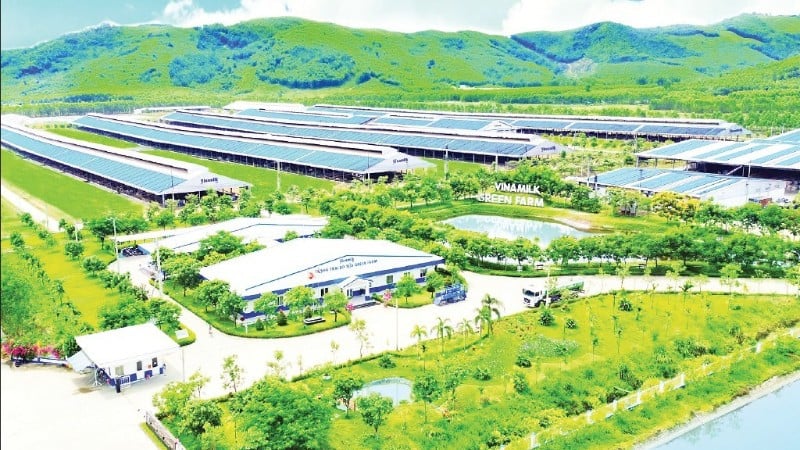
However, the application of ESG in Vietnam is still new, lacking consistency and facing many challenges in terms of institutions, capacity and compliance costs.
ESG - The inevitable transition
Although it has only appeared in recent years, ESG has quickly become a central content in socio -economic development strategies. In terms of law, the Law on Environmental Protection 2020 is considered an important milestone.
This law not only reaffirms the basic principles of environmental protection, but also adds strategic provisions such as the circular economy, strict environmental impact assessment and especially the extended producer responsibility (EPR) mechanism. These are new points that lay the foundation for integrating ESG criteria into business operations.
According to Associate Professor, Dr. Do Anh Tai, Vice Principal of Phenikaa School of Economics, developing ESG not only helps businesses improve their competitiveness but also expands opportunities to attract investment capital, meet legal requirements and optimize operating costs.
At COP26 (Conference of the Parties to the United Nations Framework Convention on Climate Change) in 2021, the Prime Minister announced that Vietnam is committed to bringing net emissions to “zero” by 2050. In order to fulfill this commitment, many ministries, sectors and large enterprises in Vietnam have proactively implemented ESG and published sustainable development reports as part of their long-term strategy.
In production and industry, many businesses have made remarkable changes. Shinec develops Nam Cau Kien Industrial Park according to the circular economy model, completing ESG reports from August 2024, helping to attract investment, reduce financial costs and increase social prestige.
Vinamilk applies GRI (Global Reporting Initiative) standards and implements circular economy in livestock farming and milk production. In the real estate industry, corporations such as Novaland and Nam Long aim for green building certification to attract international investors...
Experts say that ESG practices not only help businesses meet sustainable development requirements but also create new values, enhance their position, reputation and ability to participate in global value chains in the context of markets increasingly focusing on "green" standards.
Need to overcome barriers
In Hanoi, the small and medium-sized enterprise (SME) sector accounts for more than 97% of the total number of enterprises, contributing greatly to GDP and creating jobs for millions of workers.
However, SMEs are also the group facing many barriers in implementing ESG: lack of capital, lack of specialized human resources and limitations in management technology. One of the biggest challenges when applying ESG is changing production and management processes to meet environmental, social and governance standards. This requires large investments in financial resources, human resources to implement...
Ms. Tran Thi Thu, General Director of Hoang Thu Textile and Garment Company Limited, said: “When pursuing ESG goals, businesses also encounter many barriers. To apply ESG standards, the investment costs of businesses have increased significantly when the unit has to invest in building a factory that meets green building standards (LEED). Along with that is the human issue, businesses must focus on training staff, raising awareness of ESG throughout the organization to ensure the smooth implementation of ESG practices...”.
In addition, according to experts, one of the biggest challenges is the initial investment cost, as converting to renewable energy or implementing ESG requires large capital.
For example, many businesses in the wood processing industry want to apply solar energy, but face difficulties because they do not have access to preferential loans or technical support.
The second is the issue of human resources, as currently, domestic enterprises lack a team of ESG experts. This not only affects the construction of ESG reports but also slows down the implementation of green solutions. Many small textile enterprises, although wanting to participate in the green supply chain of large brands, are "drowned" because of the lack of experienced people to do it.
According to experts, one of the biggest challenges is the initial investment cost, as converting to renewable energy or implementing ESG requires large capital.
In addition, uneven awareness is also a big challenge in terms of policies from business leaders... ESG is increasingly becoming a key factor in assessing business performance and responsibility. Integrating ESG helps improve costs, increase adaptability, access sustainable finance, expand markets, enhance reputation and brand.
Based on the above reality, to overcome barriers and promote businesses to practice ESG more strongly in the coming time, according to Dr. Nguyen Thi Luyen, Institute for Policy and Strategy Research, there needs to be cooperation from the whole society. The State needs to continue to improve mechanisms and policies related to ESG practice so that businesses have a set of tools and criteria to apply conveniently.
In addition, it is necessary to increase support policies and encourage businesses to implement green transformation and ESG practices, especially policies on fiscal policy, credit, and support for human resource training...
On the business side, it is necessary to change management thinking towards transparency, ESG needs to be considered a long-term strategy, not a short-term cost. Businesses must proactively improve their ESG management capacity.
Investing in green technology and digital transformation is inevitable, from using renewable energy, managing supply chains using blockchain to applying AI in forecasting climate risks; proactively participating in the green capital market by issuing green bonds or participating in carbon credit trading.
Along with that, it is necessary to build a brand associated with sustainability, publish transparent ESG reports according to international standards to enhance reputation and build trust from both investors and consumers.
Source: https://nhandan.vn/giai-phap-thuc-day-thuc-thi-tieu-chuan-esg-tai-cac-doanh-nghiep-post916356.html




![[Photo] Collecting waste, sowing green seeds](https://vphoto.vietnam.vn/thumb/1200x675/vietnam/resource/IMAGE/2025/10/18/1760786475497_ndo_br_1-jpg.webp)































































































Comment (0)